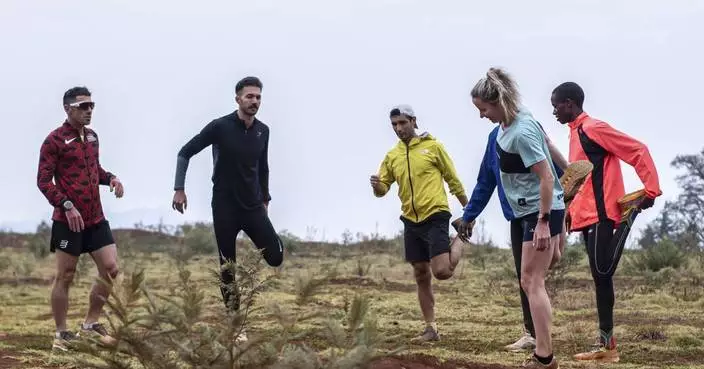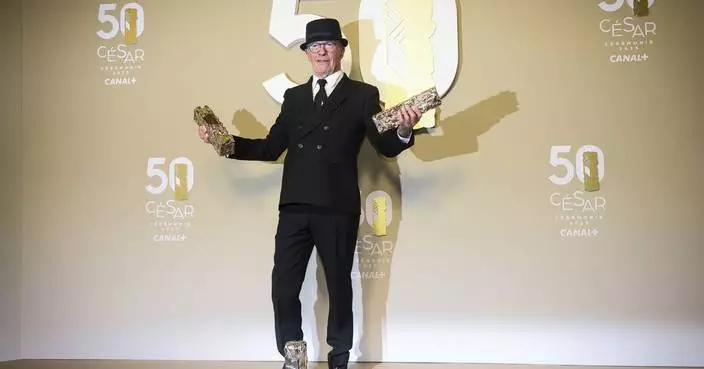Anna McNuff started to run barefoot after witnessing people in New Zealand doing it – and decided to give it a go herself.
A female adventurer and former GB rower, who claims to have been “feral” as a child, has shared her plans to run 2,620 miles across the length of the UK, completely barefoot.
A Girl Guides ambassador and motivational speaker, Gloucester-based Anna McNuff, 34 – whose parents also rowed for Great Britain in the Olympics – has been running extreme distances across the world since 2013 – but usually in top-of-the range £100 Brooks sports shoes.
Her barefoot epiphany came during a 2015 trip to New Zealand, when she ran 1,911 miles across the country over 148 days and, inspired by the number of barefoot runners she encountered, after 1,000 miles kicked off her shoes.
A tomboy through and through growing up, she immediately fell into the barefoot running groove, saying: “I was a little bit feral as a child and used to like running around with grazed knees and muddy feet.
“I was always mucking in with my brothers and the boys at school – I think it was only when I was about 20 that I realised I was female!
“My instinct had always been not to wear shoes and I remember my mum always telling me to put them on.”
She continued: “Now, while I’m not a barefoot evangelist, I love it and it has made such an impact on my running style.”
Despite her love of going shoeless as a youngster, growing older, Anna began to conform.
But, inspired by her New Zealand trip, she said: “People there are much happier to run and play sport barefoot, so I thought to myself, ‘Why am I wearing trainers when our feet are built to be free?'”
On returning to the home she shares with her partner Jamie McDonald, 32, a fellow adventurer and motivational speaker, she continued to jog barefoot.
Now, speaking of her next UK running challenge, which will take from June to November, she said: “Feet are amazing, complex machines with over 7,000 nerve endings in each sole and 26 bones in each foot.
“So, in this adventure I’m looking to see if I can coax my feet into doing what they were truly built to do, after a lifetime of being squidged up in shoes.”
Despite her rowing coach mum Sue, 62, and consultant dad Ian, 62, being incredibly sporty, Anna – who has two brothers, accountant Jonty, 32, and project manager Jamie, 36, – recalls her mother’s displeasure at her barefoot antics as a child.
Anna laughed: “In typical mothering fashion, she was always telling me to put some shoes on and keep my feet warm in case I caught a cold.”
A GB rower, although not an Olympian, Anna stopped competing aged 23 and went to work in marketing before getting the sporting itch again and setting off to cycle 11,000 miles around America in 2013.
Since then, her love of adventure has only grown and has seen her complete some ambitious escapades, like a cycle along the Andes mountains and running the 86-mile length of Hadrian’s Wall dressed as a Roman soldier.
Anna, who earns a living giving motivational talks to companies and schoolchildren, then set her sights on running across New Zealand – where she finally freed her feet.
She explained: “It was really liberating to realise that I didn’t have to wear trainers and that this was a way of exercising that people in other parts of the world actually did.”
In England, she graduated her descent into barefoot running, working down from trainers, to shoes, to socks and finally daring to go bare.
Even the inevitable – and often unpleasant – hazards she has encountered have not put her off.
She continued: “I have occasionally stepped on broken glass and in dog mess. But that’s all part of the experience and you pretty quickly grow hard callouses and thick skin on the bottom of your feet.”
Not everyone understands her running style, however, and she has received everything from snide comments to strangers offering to give her their shoes.
She said: “It took a little while to rebalance my muscles and there were times, at first, when I’d stagger home after running barefoot.
“It feels great now, though. I am lighter on my toes, my joints are under less strain and my thigh and calf muscles have become a lot more toned.
She added: “As for my feet – they’re like panther paws!”
In June, Anna will be starting her next mammoth challenge in the Shetland Islands and will finish in London – covering the distance of a full marathon most days for 155 days.
“I think it’s something I know I would be able to do wearing shoes, but going barefoot will be a real challenge – which makes it all the more exciting,” said Anna, who is encouraging others to join her at various stages along the way.
She continued: “I admit it’s pretty daunting, too, and I’m terrified that some sort of showstopper event will happen along the way that may prevent me from running.”
But Anna, who will be speaking at girl guiding units along the way, hopes to encourage girls to push themselves beyond their comfort zones.
“The world has become very sanitised these days and people are wrapped up in cotton wool,” she said.
She concluded: “I’m not saying that everyone should be like me and run around with no shoes on, but sometimes doing things that are a little unusual and which stand outside societal norms are the most rewarding of all.”
WASHINGTON--(BUSINESS WIRE)--Mar 12, 2025--
This Earth Day, embark on an unforgettable adventure with Emmy ® and BAFTA Award-winning Nat Geo Explorer Bertie Gregory ( @BertieGregory ) in SECRETS OF THE PENGUINS! Executive produced by National Geographic Explorer-at-Large and Academy Award ® -winning filmmaker James Cameron and Emmy and BAFTA winners Ruth Roberts and Martin Williams from Talesmith, this latest installment in National Geographic’s Emmy-winning “Secrets of” franchise takes viewers of all ages to the farthest corners of the world to witness penguin behaviors captured on film for the first time—showcasing the cute and fluffy flightless birds as they brave some of the most extreme environments on Earth. Narrated by Blake Lively (“Another Simple Favor”), the three-part series premieres April 20 at 8/7c on National Geographic, with all episodes streaming April 21 on Disney+ and Hulu. Disney Channel will also celebrate SECRETS OF THE PENGUINS by airing the first episode on Earth Day, April 22, at 8/7c.
This press release features multimedia. View the full release here: https://www.businesswire.com/news/home/20250312246679/en/
This year, The Walt Disney Company will celebrate Earth Month with an enterprise-wide campaign led by National Geographic to inspire audiences to appreciate the world around us using the power of storytelling. Throughout April, the ourHOME campaign will feature exciting new content releases, digital and experiential activations, and will showcase global efforts to protect, restore, and celebrate the natural world – allowing viewers, fans, and followers to discover there is even more to love about this place we call home.
While many documentaries have explored penguins, SECRETS OF THE PENGUINS takes it to a whole new level. Talesmith’s team, led by Bertie and over 70 world-class scientists and filmmakers, embarked on a two-year, globe-spanning adventure—from the rocky beaches of Cape Town and the icy shores of South Georgia Island to the tropical Galapagos and Namibia’s desert caves—capturing penguins like never before. Pushing the boundaries of wildlife filmmaking, a three-person crew endured an astonishing 274 days filming on the Ekström Ice Shelf in Antarctica, home to a colony of 20,000 emperor penguins. Facing one of the planet’s harshest environments, they captured never-before-seen moments like a bonded pair of emperors practicing egg transfers with a snowball to hone their skills for the moment they would need to transfer a real egg, tenacious chicks navigating brash ice amid climate change, and young penguins using their beaks to hoist themselves out of a crevasse.
With breathtaking, award-winning cinematography and cutting-edge camera technology, the series captures even more never-before-seen and rare moments in the wild. For the first time, witness healthy “rockaroni” chicks—a rare hybrid of rockhopper and macaroni penguins—offering a fascinating glimpse into potential evolution and adaptation. Other remarkable scenes include a brave rockhopper fending off a southern sea lion, the first-ever footage of a hidden cave colony of African penguins, and clever Galapagos penguins teaming up for a daring heist: stealing fish straight from pelican beaks and skillfully herding sardine bait balls.
In April 2024, Nat Geo unveiled breathtaking emperor penguin footage captured by Bertie at the Ekström Ice Shelf in Antarctica for the series. A television first, the crew recorded an astonishing sight: hundreds of emperor penguin chicks leaping from a 50-foot cliff into the icy ocean below, emerging unscathed. The series will showcase the full spectacle of this remarkable behavior, along with new footage that was not initially included in the viral video. To date, the clip has garnered 74 million views on Nat Geo’s TikTok account—its best-performing video ever—and has received over 165 million views across all of Nat Geo’s social platforms. Bertie’s natural history filming resonates so much with viewers that he has captured some of the most-viewed videos on Nat Geo’s Instagram account this past year. The emperor penguins video has nearly 63 million views, while the second highest is Dzanga-Sangha National Park sweat bees with 34 million views, followed by B1 Antarctic killer whales with 23 million views, both from his Disney+ Original series from Nat Geo ANIMALS UP CLOSE WITH BERTIE GREGORY, currently filming its second season.
The family-friendly series taps into the passion and expertise of world-renowned scientists and conservationists, including National Geographic Explorer and marine biologist Dr. Pablo Borboroglu, conservation biologist Dr. Michelle LaRue, African penguin expert Dr. Andrea Thiebault, doctor of veterinary medicine Dr. Gustavo Jiménez Uzcátegui, penguin expert Dr. Jessica Kemper, and marine biologist Dr. Katta Ludynia.
Episodes include the following:
Previous “Secrets of” seasons include SECRETS OF THE OCTOPUS, narrated by Paul Rudd; SECRETS OF THE ELEPHANTS, narrated by Natalie Portman; and Emmy-winning SECRETS OF THE WHALES, narrated by Sigourney Weaver. All installments are currently streaming on Disney+ and Hulu.
SECRETS OF THE PENGUINS is produced by Talesmith for National Geographic. Emmy Award-winners James Cameron and Maria Wilhelm for Lightstorm Earth are executive producers. BAFTA and Emmy Award-winner Bertie Gregory serves as lead storyteller, cinematographer and producer. For Talesmith, Emmy and BAFTA-winning executive producers are Ruth Roberts and Martin Williams. Series producer is Serena Davies. Pam Caragol is executive producer for National Geographic.
#NatGeo | #SecretsofthePenguins | #DisneyPlus
Instagram: @NatGeoTV | @BertieGregory | @DisneyPlus | @Hulu | @talesmithtv
TikTok: @NatGeo | @BertieGregory | @DisneyPlus | @Hulu
X: @NatGeoTV | @BertieGregory | @DisneyPlus | @Hulu | @talesmithtv
Facebook: @NatGeoTV | @BertieGregory | @DisneyPlus | @Hulu | @talesmithtv
About National Geographic Content
Representing the largest brand on social media with over 780 million followers and 1.1 billion impressions each month, National Geographic Content's award-winning and critically acclaimed storytelling inspires fans of all ages to connect with, explore and care about the world through factual storytelling. National Geographic Content, part of a joint venture between The Walt Disney Company and the National Geographic Society, reaches over 532 million people worldwide in 172 countries and 33 languages as a digital, social and print publisher and across the global National Geographic channels (National Geographic Channel, Nat Geo WILD, Nat Geo MUNDO), National Geographic Documentary Films, and direct-to-consumer platforms Disney+ and Hulu.
Its diverse content includes Oscar®- and BAFTA award-winning film Free Solo, Oscar-nominated films Sugarcane, Fire of Love and Bobi Wine: The People's President, Emmy® Award-winning franchise 9/11: One Day in America and JFK: One Day in America, Emmy® Award-winning series Animals Up Close, series Trafficked with Mariana van Zeller, Life Below Zero, and Secrets of the Whales, in addition to multiple National Magazine Awards, Pulitzer Prize Finalists and Webby wins. Visit nationalgeographic.com and natgeotv.com or explore Instagram, Threads, Facebook, LinkedIn, YouTube, TikTok, and Reddit.
About Talesmith
Talesmith is a leading creative force in global television, film and immersive production, led by Bafta and Emmy-winning film-makers Martin Williams, Ruth Roberts and Mark Wright. With decades of award-winning experience, the British company crafts world-class content and embraces new technologies to push storytelling boundaries. Talesmith’s acclaimed cross-platform output includes high-end factual series, unscripted series, landmark specials, and immersive content.
www.talesmith.tv
Instagram: @talesmithtv | LinkedIn https://uk.linkedin.com/company/talesmithtv


Photo by National Geographic





















































